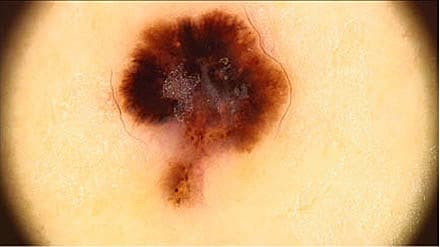Akut induceret diabetes mellitus hos en patient i behandling for metastaserende malignt melanom


Line Bisgaard Jørgensen & Knud Yderstræde
Behandling med immuncheckpointhæmmere ved dissemineret malignt melanom har vundet betydeligt indpas i de seneste par år pga. effekten på overlevelsen hos patienterne med denne lidelse. Der er beskrevet en række endokrinologisk relaterede bivirkninger af behandlingen, herunder hypofysitis og tyroiditis/myksødem. På kasuistisk niveau er der desuden beskrevet få tilfælde af akut opstået diabetes mellitus [1].
En 63-årig kvinde blev behandlet med ipilimumab for dissemineret malignt melanom. Hun havde forinden været i behandling med pembrolizumab pga. recidiv, men man skiftede til behandling med ipilimumab, da der blev påvist spredning til højre lyske og lungerne.
Efter at have fået den fjerde serie med ipilimumab, udviklede hun primær hypotyroidisme med et thyroideastimulerende hormonniveau på 40 × 103 IE/l. En uge senere blev hun indlagt akut med kvalme, opkastninger, svimmelhed og almen utilpashed. Der var mistanke om hypofysitis. De biokemiske prøver viste, at hun havde ketoacidose med følgende målte niveauer: pH 7,23, bikarbonat 7,4 mmol/l, blodglukose 30 mmol/l og blodketoner 5,6 mmol/l. Ved indlæggelsen havde hun kun let forhøjet niveau af glykeret hæmo-globin på 50 mmol/mol (referenceværdien er < 48 mmol/mol), men var insulinopen med et c-peptidniveau på 19 pmol/l, hvilket tydede på hurtig udvikling af tilstanden (Tabel 1). Efter den akutte behandling for ketoacidose, påbegyndte man behandling med basal bolusinsulin. På mistanke om hypofysitis igangsatte man desuden højdosisbehandling med prednisolon og overgik senere til behandling med hydrokortison. En senere ambulant foretaget synactentest viste insufficient respons. Der blev desuden foretaget MR-skanning pga. ukarakteristiske cerebrale symptomer. Skanningen viste ingen tegn på disseminering eller hypofysitis.
Ved udskrivelsen var patienten fortsat præget af træthed, men i relativt god almentilstand. Efter udskrivelsen blev det i onkologisk regi ved en CT konstateret, at der var tæt på komplet remission af metastaserne.
Ipilimumab er et rekombinant, monoklonalt antistof, som binder sig til CTLA-4-receptoren på T-lymfocytterne. Dette medfører, at T-lymfocytterne forbliver aktive og udøver antineoplastisk effekt. Der er beskrevet en lang række bivirkninger af behandlingen. Disse bivirkninger er primært immunmedierede og omfatter dermatitis, kolitis, hepatitis, hypofysitis og tyroiditis [2]. I litteraturen er der kun beskrevet ét tilfælde med udvikling af diabetes mellitus efter behandling med ipilimumab [3]. Der er dog beskrevet flere sporadiske tilfælde efter behandling af malignt melanom med
anti-programmed death (PD)1 (nivolumab, pembrolizumab), som ligeledes er checkpointhæmmere [1, 2, 4]. Den nævnte diabetesform er karakteriseret ved en meget beskeden insulinproduktion og debuterer ofte med ketoacidose som hos patienten i sygehistorien [1].
Tilstedeværelsen af autoantistoffer er varierende i de nævnte sygehistorier. Hughes et al beskriver fem sygehistorier med akut udvikling af diabetes mellitus efter behandling med anti-PD-1, hvoraf tre patienter havde positive autoantistoffer [1].
Der er formentlig en autoimmun udløsende årsag til udviklingen af akut diabetes. Andre årsager er virusinfektion, familiær disposition, metastaser i pancreas og medikamina (e.g. glukokortikoider) [4]. Patienten i sygehistorien blev behandlet med højdosis prednisolon. Denne behandling medfører ofte en grad af insulinresistens, men i dette tilfælde blev behandlingen først initieret efter debut af ketoacidose. Inden behandlingen med ipilimumab havde patienten desuden været i behandling med pembrolizumab, men der blev skiftet til ipilimumab pga. manglende effekt. Studier af kombinationsbehandling med disse antistoffer har vist, at de øger overlevelsen signifikant, men også medfører en øget risiko for toksicitet, som kan have været en medvirkende årsag til forløbet af den aktuelle sygehistorie [5].
I denne sygehistorie fik patienten diagnosen diabetes mellitus seks uger efter påbegyndelse af behandlingen med ipilimumab. I de tidligere sygehistorier varierer denne periode fra en uge til fem måneder efter første dosis med checkpointhæmmere [1, 2]. Man bør derfor være opmærksom på denne alvorlige bivirkning under hele behandlingsperioden.
Med denne sygehistorie vil vi henlede opmærksomheden på de komplekse følgestilstande til behandling med checkpointhæmmere. Onkologer, endokrinologer og læger fra andre medicinske specialer bør være observante, når en sådan behandling indledes, eftersom der kan vise sig et meget broget billede af hormonel dysfunktion. Anvendelsen af disse antistoffer forventes øget i betydeligt omfang, og bivirkningerne kræver en hurtig indsats.
Korrespondance: Line Bisgaard Jørgensen.
E-mail: line.bisgaard.joergensen@rsyd.dk
Antaget: 15. juni 2017
Publiceret på Ugeskriftet.dk: 11. september 2017
Interessekonflikter: ingen.
Immune checkpoint inhibitors have improved survival rate in patients with advanced melanoma, but also have the potential to induce several adverse events. We report on a 63-year-old woman who had advanced melanoma and was admitted with diabetic ketoacidosis, which had occurred upon treatment with ipilimumab. On admission, the C-peptide level was low, and the HbA1c concentration was 50 mmol/l indicating a rapid onset of the disease. The patient had also been diagnosed with thyroiditis. Diabetes mellitus is a rare and serious side effect of treatment with ipilimumab, and we recommend being aware of this due to the rapid course.
Hughes J, Vudattu N, Sznol M et al. Precipitation of autoimmune diabetes with anti-PD-1 immunotherapy. Diabetes Care 2015;38:e55-7.
Aleksova J, Lau PK, Soldatos G et al. Glucocorticoids did not reverse type 1 diabetes mellitus secondary to pembrolizumab in a patient with metastatic melanoma. BMJ Case Rep 2016;23.2016.
Yamazaki N, Kiyohara Y, Uhara H et al. Phase II study of ipilimumab
monotherapy in Japanese patients with advanced melanoma. Cancer Chemother Pharmacol 2015;76:997-1004.
Okamoto M, Okamoto M, Gotoh K et al. Fulminant type 1 diabetes mellitus with anti-programmed cell death-1 therapy. J Diabetes Investig 2016;7:915-8.
Larkin J, Chiarion-Sileni V, Gonzalez R et al. Combined nivolumab and
ipilimumab or monotherapy in untreated melanoma. N Engl J Med 2015;373:23-34.